Table of Contents
The missiles stopped falling on Tel Aviv about twelve hours ago, but what just happened will reshape the Middle East for generations. This wasn't just another military operation - it was Israel's definitive answer to a regime that has spent decades orchestrating the destruction of everything it touches.
Key Takeaways
- Israel has fundamentally shifted from a containment strategy to a removal strategy - threats are no longer deterred, they are eliminated
- The strike represents 150 years of Islamic theological crisis coming to a head, with Iran using Israel's destruction as proof of Shia redemption
- Iran's nuclear program served a dual purpose: protection from retaliation and the ability to deploy tactical weapons against Israeli responses to proxy attacks
- The Mossad has doubled in size over 15 years and become the second-largest intelligence agency after the CIA in terms of budget
- Israel's capabilities revealed in Iran demonstrate massive ground support - you can't build secret drone factories without extensive local cooperation
- This operation could only have happened under Trump; a Harris administration would have actively opposed and potentially warned Iran
- The success fundamentally delegitimizes Iran's revolutionary ideology across the Muslim world, potentially triggering theological reconsideration
There Is Evil in the World, and Sometimes You Must Face It
The quote that frames everything comes from Tolkien's The Hobbit: "They lived in peace unaware that they were being watched and protected over." Israeli analyst Haviv Rettig Gur uses this to describe a fundamental disconnect between how Israelis and Westerners view the world.
When British Prime Minister Keir Starmer issued his tepid statement about "reports that something happened" hours after Israeli strikes began, calling for "deescalation" as the most important priority, he revealed something profound about Western elite thinking. There's no real understanding that Iran is a regime that actually destroys things, that there are people who pay deep costs for Western inaction.
Without Iran's backing, Assad could not have killed 600,000 Syrians. Without Iran's support, the Yemen civil war that killed a quarter million people from starvation alone could not have happened. The costs of not facing down Iran are measured in mass graves across the Middle East.
"There are people in this world who look out and think that whatever safety you have in America, Canada, Britain, Australia is the safety that all in the world experience," Gur explains. "They just don't understand that the reason English speakers in this world are safe is because of American power."
Germany can spend 1.6% of GDP on defense while Israel spends 5% because someone else - America - has been defending Germany since World War II. The protected have been protected for so long they've forgotten they were protected, exactly as Tolkien describes the hobbits.
Israel understands what much of the West has forgotten: there is evil in the world, and sometimes you have to face it down because the alternative is watching it methodically destroy everything decent.
Iran's Revolutionary Theology of Destruction
To understand why Iran has spent a double-digit percentage of its GDP trying to destroy a country it has no border with and no rational interest in, you need to go back 150 years to the beginning of Islamic theological crisis.
When European powers began carving up the Ottoman Empire in the 1800s - the British taking Egypt, the French taking Algeria - it triggered a profound self-examination among Islamic intellectuals. How had the Muslim world gone from 400 years of Ottoman stability to discovering they were "catastrophically weak and backward compared to this surging powerful West"?
The theological answers produced movements like the Muslim Brotherhood, which argued that returning to original Islamic piety would restore divine favor and geopolitical strength. But there was a specific focus that emerged early on the Zionist movement, articulated by influential theologians like Rashid Rida in the 1910s and 1920s.
"The Jews of the 1890s, the Jews of that whole era are the weakest people in the world. They're these desperate refugees fleeing Eastern Europe pathetically weak with nothing but the shirts on their backs," Gur explains. "And they're building out a national movement that is planting powerful roots in Muslim land."
If the British Empire conquers Egypt, that's theologically problematic but understandable - the British are very powerful. But if the Jews of 1905 can push back Islam, "that's a catastrophic signal of Islamic weakness. And so everything turns in this profoundly angry and vindictive way on Zionism."
For Iran's revolutionary Shia regime, destroying Israel becomes proof that Shiism can redeem Islam from centuries of weakness in ways that Sunni movements have failed to achieve. It's not about Palestinians - it's about cosmic religious validation.
"Iran wants to destroy Israel because Israel is the weakest thing that ever pushed Islam back. And success in destroying Israel would be a signal that Shiism is capable of redeeming Islam from this weakness," Gur explains.
This is why Iran has built an entire "axis of resistance" spanning Hamas, Hezbollah, Syrian militias, Iraqi proxies, and Houthi forces. It's why they've been willing to sacrifice hundreds of thousands of lives across multiple countries. The destruction of Israel serves as the vocabulary for discussing revolutionary Shiism's ultimate goals.
The Strategic Revolution: From Containment to Removal
What happened on Friday night represents a fundamental shift in Israeli strategic thinking that's been building since October 7th. For decades, Israel's approach was containment - managing threats, deterring attacks, maintaining an equilibrium that prevented full-scale war.
The Lebanon experience shaped this thinking profoundly. Israel's 18-year occupation of southern Lebanon created more problems than it solved, ultimately producing Hezbollah as a more dangerous enemy than the Palestinian groups it was meant to stop. The lesson seemed clear: military occupations create new threats, withdrawal is sometimes the better option.
But Iran and its proxies learned the opposite lesson. They concluded that constant harassment could eventually force Israel to withdraw from anywhere, and that withdrawal would always be filled by hostile forces. This became the template: endless rocket attacks, suicide bombings, and proxy warfare designed to make Israeli life unbearable until the elites emigrate and the state collapses.
"They interviewed the national security adviser of the supreme leader of Iran and asked him, 'You really think Israel is going to be kicked out by some rockets?'" Gur recounts. "His response was, 'We're not idiots. We don't think they're all going to get on a boat and leave in two weeks like happened to the million French citizens in Algeria in 1962. We think that we will make life so unbearable that the elites will leave.'"
October 7th shattered this entire framework. It demonstrated that Iran's proxies were "undeterable" - willing to sacrifice Gaza's entire population for their revolutionary religious vision. Hamas was "perfectly okay with the destruction of Gaza because the salvation of Islam is at stake in this war."
Israel's response represents a completely new strategic doctrine: threats are no longer contained or deterred, they are removed. Period.
The Mossad's Transformation Into a Strategic Weapon
The intelligence component of Friday's operation reveals capabilities that seem to belong in science fiction. Building secret drone factories inside Iran, tracking military commanders for decades, coordinating simultaneous strikes across multiple cities - this represents intelligence penetration on a scale that's historically unprecedented.
The Mossad has undergone a fundamental transformation since Mayor Dagan took over in 2002 and made Iran the number one priority. According to published reports, the agency has roughly doubled in size over 15 years and developed entirely new branches and capabilities. It's become the second-largest intelligence agency in the world by budget, after the CIA.
But size alone doesn't explain these capabilities. "A lot of the commandos that we're hearing about now in Iranian soil that built out these drone attacks and that are doing operations in Iran at the moment on the ground - a lot of them aren't Israelis," Gur reveals.
The key insight is that you can't achieve this level of penetration without massive local support. The Iranian regime's fundamental weakness creates exactly the conditions intelligence services can exploit. "So many Iranians want this regime to end. I don't think they know Israel, like Israel, care about Israel, love Israel, hate it. I don't think they're in any way emotionally invested in Israel. They want this regime to end."
The videos of Mossad operatives inside Iran aren't just tactical documentation - they're strategic psychological warfare designed to demoralize the regime and demonstrate total penetration. Every Iranian official now has to assume Israel knows their location, their family members, their daily routine.
Trump's Critical Role: This Could Never Have Happened Under Harris
The political dimension of this operation reveals how crucial American support - or at least non-interference - was to Israeli success. While Israel conducted the military operation independently, it cannot fly toward Iran without CENTCOM knowing about it.
"Israel has retrofitted the F-35s in ways that the Americans when they sell F-35s, they sell them with systems that allow America to track them," Gur explains. "Israeli F-35s have this habit of occasionally disappearing from the American radar, but there would not have been a way for Israel to fly toward Iran without CENTCOM knowing about it."
A Harris administration would have approached this completely differently. Looking at responses from figures like Ben Rhodes - who called the strikes "dangerous and unnecessary" - provides a window into how Democratic foreign policy establishment would have reacted.
"A President Harris would not have agreed to allow it to go forward. It would have looked to them very irresponsible and potentially bringing about a World War III," Gur argues. "Harris could have been a real disruptor. It could have warned Iran as a way of telling the Israelis, 'Don't do it.'"
The coordination between Trump and Netanyahu appears to have been extensive, possibly involving the elaborate deception around negotiations that kept Iran off-guard. Trump's 60-day ultimatum to Iran, which expired exactly on the day of the strikes, suggests careful choreography.
But beyond tactical coordination, Trump's fundamental worldview made this possible. He genuinely believes Iran cannot be allowed nuclear weapons, and he's willing to let Israel do the "dirty work" rather than deploy American forces directly.
The Nuclear Program: More Than Weapons, It's About Regime Survival
Iran's nuclear program served a dual strategic purpose that most analysis misses. Obviously, nuclear weapons would provide protection from retaliation. But equally important, they would enable Iran to use tactical nuclear threats to prevent Israel from responding to proxy attacks.
If Iran had nuclear weapons, they could potentially deploy them to protect Hezbollah during a major operation, or threaten nuclear response if Israel tried to eliminate Hamas after another October 7th-style attack. This would fundamentally alter the strategic balance and make Israel's conventional military advantages irrelevant.
The strikes hit major facilities including Natanz, Iran's primary uranium enrichment site, which appears to be "profoundly damaged" with "a whole lot of smoke coming out of it." But the key facility - Fordow, buried under a mountain - remains intact because Israel lacks the massive ordnance penetrators needed to destroy heavily fortified underground sites.
This creates a crucial decision point for the Trump administration. Either the U.S. directly participates in destroying Fordow with B-2 bombers and bunker-buster bombs, or this campaign remains incomplete. As Trump said in his Truth Social post, this "is going to continue and it's going to get worse," but Israel may need American equipment to finish the job.
The alternative is the kind of special forces operation that would make Entebbe look simple - Israeli commandos infiltrating deep into Iran to disable the facility from within. It's been reported that such operations have been practiced, but the risks would be enormous.
The Theological Implications: When God's Will Becomes Clear
One of the most fascinating aspects of this conflict involves the theological implications for Islamic revolutionary movements. Within the ideological framework that drives both Sunni groups like Hamas and Shia movements like Iran's regime, geopolitical success is considered evidence of divine favor.
"Geopolitical success is a sign of divine will," Gur explains, describing the theological foundation. "The correlary is that geopolitical failure is a sign that God is not with you. You did something wrong that God didn't want you to do."
This creates a potential crisis for revolutionary Islamic ideology. If everything these movements touch - Lebanon, Yemen, Syria, Gaza - gets destroyed, other Muslims might conclude "maybe it's wrong, maybe it's not a good idea."
The conservative Sunni kingdoms - Saudi Arabia, UAE, Morocco, Jordan - are already making this argument. Everything radical Islam touches, it destroys, so obviously it's not representing God's actual will.
For Hamas specifically, this creates what psychologists call a "sunk cost fallacy." They've invested so much in their current path, destroyed so much of Gaza, that admitting failure becomes psychologically impossible even when it's mathematically correct.
But the broader impact could be profound. "The Iranians will never again be able to say to the Middle East, 'We are the great and fearsome lion. We are the destroyers of Israel. We are the great Shia revolution that will kick out the Jews,'" Gur observes. "They never with a straight face be able to say that in the region."
Gaza's Future: The Sunk Cost Fallacy in Practice
The impact on Gaza illustrates the tragic consequences of ideological rigidity in the face of obvious failure. Hamas's decision to launch October 7th has systematically destroyed everything they claimed to be fighting for.
"Sinwar's decision to carry out October 7 destroyed the Iranian axis that had built Hamas into what it became," Gur explains. The entire "axis of resistance" is shattered and "it'll take a generation to rebuild if it's even rebuildable."
Logically, Hamas should cut its losses, accept the deal on the table - leadership leaves Gaza, Hamas disarms, Arab states and the West rebuild with Israeli cooperation. This would actually be good for Gaza because "as long as Hamas remains in Gaza, you can't do any of that. You can't rebuild Gaza. You can't send money in. You can't send concrete in."
But Hamas faces the classic sunk cost problem. They've invested so much, destroyed so much, faced so much anger from Gazans themselves that admitting failure seems impossible. There are now anti-Hamas protests in Gaza, and Hamas has been "systematically massacring dissidents," hunting them down and filming executions to terrorize the population.
The international dimension makes this worse. "Every single time that an international leader does not say Hamas is at fault, Hamas says we haven't lost yet," Gur observes. The pro-Palestinian activist movement "continues the war because it gives Hamas the hope that there's some other arena in which this war is actually taking place."
The Historical Parallel: Israel's Afghanistan Moment
Israel's previous experience in Lebanon provides crucial context for understanding the current strategic shift. The 18-year occupation of southern Lebanon was "our Afghanistan" - an attempt to create security through territorial control that ultimately generated more threats than it eliminated.
Initially, Israel invaded Lebanon because of horrific terrorist attacks like the Malot massacre of 1974, where commandos took over a school and killed 22 children. The security zone was meant to prevent such attacks by controlling the border area.
But the occupation created Hezbollah as a more dangerous enemy than the Palestinian groups it was meant to stop. By 2000, when Israel withdrew, Hezbollah had created an image of being "basically undestroyable because it didn't need to win. It only needed to survive."
This established a template that Iran and its proxies have followed ever since: constant harassment until the enemy eventually leaves, then filling the vacuum with hostile forces. "Within six months, Israel pulls out of South Lebanon in May of 2000. By October of the year 2000, we begin to see triggered by a visit of an Israeli politician at Temple Mount... the fall of 2000 a massive wave over 3 years of 140 suicide bombings."
Every Israeli withdrawal - from Lebanon, from Gaza, from Palestinian cities ahead of Camp David - turned into "massive bloodshed, these rivers of blood." The lesson seemed clear: withdrawal leads to worse violence, not peace.
October 7th represented the ultimate expression of this strategy - make Israeli life so unbearable that the society eventually collapses. But it also revealed the fundamental flaw: movements driven by revolutionary religious ideology are undeterable because they value their cosmic mission more than the welfare of the people they claim to represent.
Israel's response has been to abandon the entire framework. Instead of managing threats through deterrence and containment, the new doctrine is elimination. Threats don't get contained - they get removed.
The Wider Strategic Picture: Reshaping the Middle East
The success of this operation has implications far beyond the Iran-Israel conflict. It demonstrates that precision intelligence and technological superiority can overcome traditional advantages like geography, population size, and missile arsenals.
Iran is "one of the wealthiest countries in terms of natural resources in the world and one of the poorest nations inhabiting one of the wealthiest countries." The regime has systematically destroyed Iranian society - drug use is through the roof, every social problem is at catastrophic levels, the economy has been paralyzed by massive trucker strikes.
Most importantly for regional dynamics, other actors are watching and learning. If Iran gets nuclear weapons, "the Saudis are not going to sit by without a nuke and the Turks are not going to sit by without a nuke. And if that nuclear regime collapses in the Middle East, the Taiwanese are going to look at China and say, 'Well, we got a solution to our China problem. We need a nuke.'"
The prevention of Iranian nuclear capability isn't just about Israel - it's about preventing a cascade of proliferation that would fundamentally alter global security.
For Arab states, this operation provides validation of their shift away from Iranian-backed radical movements toward cooperation with Israel and the United States. The Abraham Accords framework suddenly looks much more attractive when the alternative - Iranian revolutionary ideology - keeps producing nothing but destruction.
Netanyahu's Historical Moment
Perhaps most surprisingly, this operation represents a profound vindication for Benjamin Netanyahu personally. Despite legitimate criticisms of his domestic policies, coalition management, and handling of various aspects of the Gaza war, he has proven capable of the most important decision of his career.
"He has said, 'Test me on this one,'" Gur reflects. "If an Iranian nuke detonates 300 yards above Tel Aviv, none of the rest of his mistakes will matter. And because this will be his only mistake that matters."
Like Churchill, who made catastrophic errors throughout his career but got the one big decision exactly right, Netanyahu may be remembered primarily for this moment. "The Iranians will never again be able to say to the Middle East that they are the great and fearsome lion."
The operation required extraordinary courage - not just military courage, but the political courage to risk everything on a strategy that could have failed catastrophically. It required understanding "Israeli social resilience and strength of this people that are willing to go to this war with Iran that could be very painful and costly."
Most importantly, it required the vision to see that this was a moment when the correlation of forces made success possible - Iranian air defenses degraded, proxies weakened, American administration supportive, and Iranian nuclear program approaching the point of no return.
Whether this ultimately succeeds in preventing Iranian nuclear weapons depends on what happens next. But as a demonstration that small democratic states can successfully confront much larger authoritarian enemies through superior intelligence, technology, and strategic thinking, it represents something genuinely historic.
The hobbits, it turns out, sometimes have to pick up swords and fight the forces of darkness themselves. And sometimes, they win.





